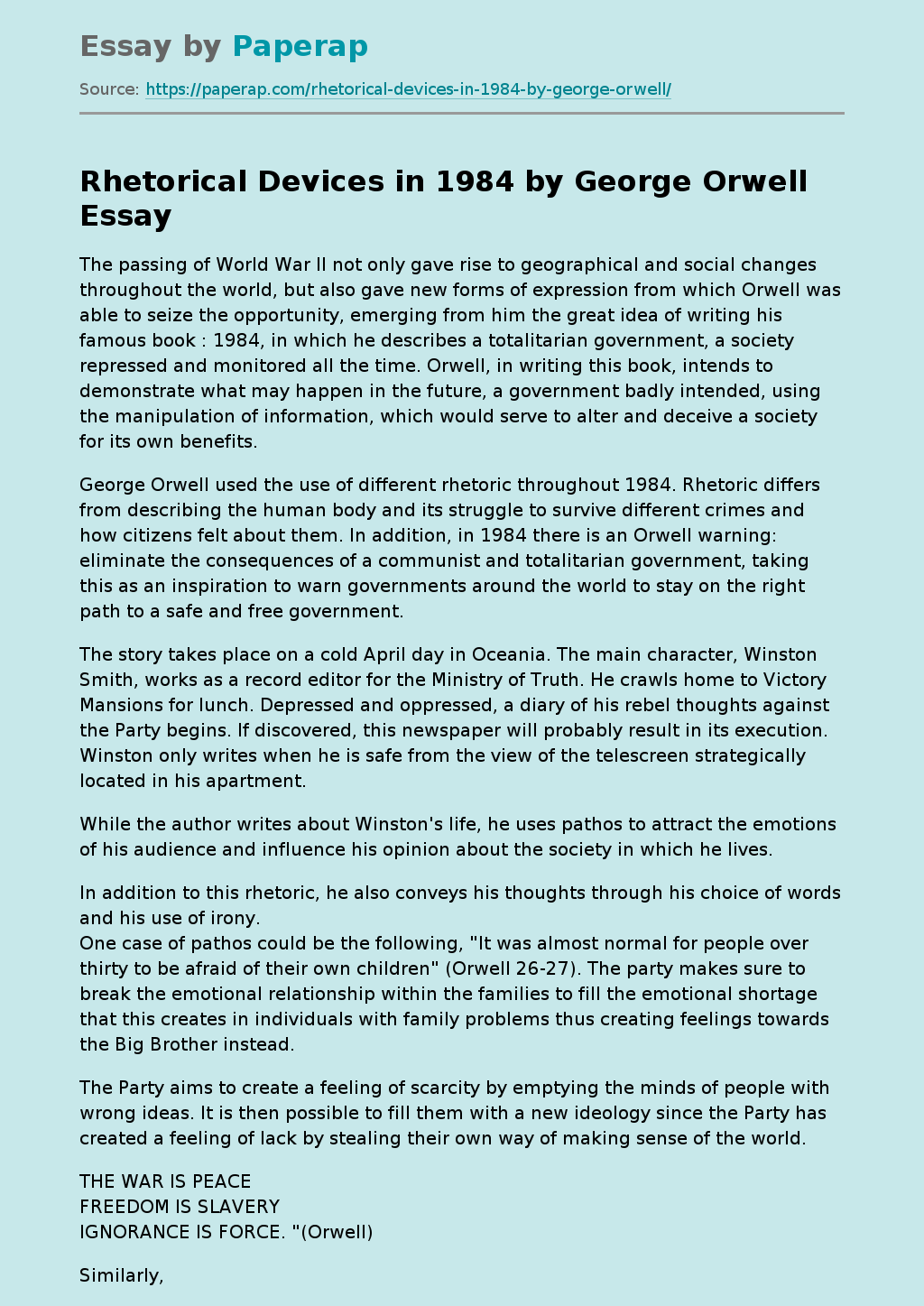Rhetorical Devices in 1984 by George Orwell
The passing of World War II not only gave rise to geographical and social changes throughout the world, but also gave new forms of expression from which Orwell was able to seize the opportunity, emerging from him the great idea of writing his famous book : 1984, in which he describes a totalitarian government, a society repressed and monitored all the time. Orwell, in writing this book, intends to demonstrate what may happen in the future, a government badly intended, using the manipulation of information, which would serve to alter and deceive a society for its own benefits.
George Orwell used the use of different rhetoric throughout 1984. Rhetoric differs from describing the human body and its struggle to survive different crimes and how citizens felt about them. In addition, in 1984 there is an Orwell warning: eliminate the consequences of a communist and totalitarian government, taking this as an inspiration to warn governments around the world to stay on the right path to a safe and free government.
The story takes place on a cold April day in Oceania. The main character, Winston Smith, works as a record editor for the Ministry of Truth. He crawls home to Victory Mansions for lunch. Depressed and oppressed, a diary of his rebel thoughts against the Party begins. If discovered, this newspaper will probably result in its execution. Winston only writes when he is safe from the view of the telescreen strategically located in his apartment.
While the author writes about Winston’s life, he uses pathos to attract the emotions of his audience and influence his opinion about the society in which he lives.
In addition to this rhetoric, he also conveys his thoughts through his choice of words and his use of irony.
One case of pathos could be the following, “It was almost normal for people over thirty to be afraid of their own children” (Orwell 26-27). The party makes sure to break the emotional relationship within the families to fill the emotional shortage that this creates in individuals with family problems thus creating feelings towards the Big Brother instead.
The Party aims to create a feeling of scarcity by emptying the minds of people with wrong ideas. It is then possible to fill them with a new ideology since the Party has created a feeling of lack by stealing their own way of making sense of the world.
THE WAR IS PEACE
FREEDOM IS SLAVERY
IGNORANCE IS FORCE. “(Orwell)
Similarly, Orwell uses logos in his book, this type of slogan of quotes occur in the first chapter of the novel. These are slogans of the Ministry of Truth of the state of Oceania. “The Party” has introduced these slogans to manipulate and control people’s minds while putting “Party thoughts” on what is important to them and what is not. This type of propaganda has also invented new information and new words such as “Two minutes of hate” and “Big Brother is watching.” In other words, these slogans aim to show the scandalous use of language to make people think what governments want them to think.
“Dissatisfied with his life, Winston resorts to vices as a means of escape and self-medication.” In Winston’s case, they are alcohol and cigarettes. He drinks gin to sedate his paranoia, like when he has a drink or two before finally writing in his diary. Smoke cigarettes for a similar reason: calm down. These common vices help Winston control his doubts and paranoia. Again, we see some irony here. Winston’s “vices” are not personal decisions, nor are they small acts of individuality or rebellion.
Therefore, it can be said that the Party acts as a rhetorical agent in the novel using various tools such as rhetorical appeals to execute its persuasion. The use of rhetorical appeals by the government shows that Party surveillance has the dual function of verifying whether people commit crimes of thought and learn more about the rebels in order to persuade them. For this reason, the power of the party is not so much in the pain it inflicts on citizens or strict vigilance in Oceania, but rather in the use of rhetoric, since rhetoric allows the Party not only to execute power, but also get it.
The power for bad actions is a warning that Winston can be an example of what a rhetorical discourse used in a cruel way can do so much harm to a human mind. Anyway, the novel shows that a rebel can be persuaded through carefully planned plans, giving us as a reference what can happen in the future if we continue to trust everything we see, and the bad information disguised that the government uses to manipulate the society.
Rhetorical Devices in 1984 by George Orwell. (2020, Oct 28). Retrieved from https://paperap.com/rhetorical-devices-in-1984-by-george-orwell/

